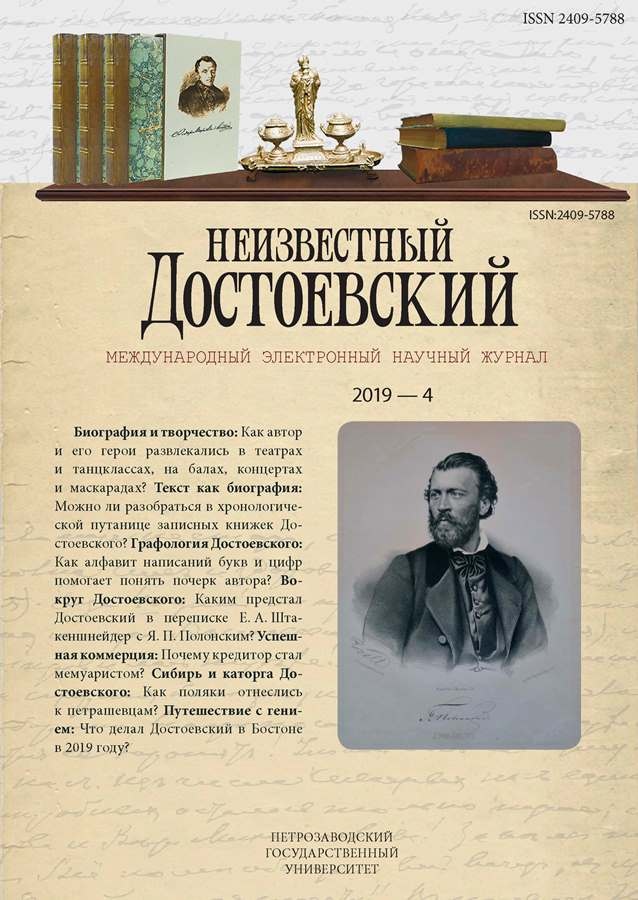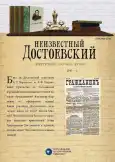Том 3, № 2 (2016)
Статьи
Достоевский — Соавтор А. У. Порецкого и В. Ф. Пуцыковича в «Гражданине»: опыт атрибуции
Аннотация
Статья посвящена проблеме атрибуции публикаций еженедельника «Гражданин»: представлены доводы в пользу авторского участия Достоевского в статье «Семейная неурядица как причина самоубийства» («Гражданин». 1873. № 49; совместно с А. У. Порецким) и в обозрении «Иностранные события» («Гражданин». 1874. № 12; совместно с В. Ф. Пуцыковичем).
 3-30
3-30


Редакторские вставки Достоевского в статьях, опубликованных в «Гражданине» (1873–1874 гг.)
Аннотация
Автор данной статьи атрибутирует Достоевскому текстовые вставки в «Петербургском обозрении» В. П. Мещерского («Гражданин». 1873. № 8), хронике «Из текущей жизни» («Гражданин». 1873. № 19), «Еженедельной хронике» («Гражданин». 1873. № 37), примечание к статье В. Ф. Пуцыковича «Хивинский поход» («Гражданин». 1873. № 24), редакторские ремарки в публикациях И. Ю. Некрасова, К. П. Победоносцева, В. Ф. Пуцыковича.
 31-44
31-44


Кто скрывается за псевдонимом «Х.»?
Аннотация
Статья посвящена актуальной проблеме установления авторства анонимных и псевдонимных статей, опубликованных в еженедельнике «Гражданин» в период редакторства Ф. М. Достоевского, а именно — менее изученному вопросу об атрибуции статей неизвестных авторов, присылавших свои материалы в редакцию «Гражданина», в сравнении с более изученным — о причастности самого Достоевского к целому ряду анонимных заметок, рецензий, рассказов и др. На основании различных материалов, включая эпистолярное наследие Ф. М. Достоевского и его корреспондентов, архивные источники, историческую, справочную, научную литературу, установлен автор «Картинок из офицерской жизни», опубликованных в № 41 «Гражданина» за 1873 год за подписью «Х.». Им оказался Николай Александрович Шахов — офицер 1-го Лейб- гвардии Екатеринославского полка Его Величества.
 45-53
45-53


Какие рукописи Достоевского были в “Piper -Verlag”?
Аннотация
Вслед за Т. И. Орнатской, Г. Л. Боград, Б. Н. Тихомировым автор статьи выдвигает новую гипотезу о возможном местонахождении утерянной в годы Гражданской войны беловой рукописи последнего романа Ф. М. Достоевского «Братья Карамазовы». Ключевой фигурой предлагаемой версии является австрийско-американский писатель и журналист Рене Фюлоп-Миллер, в 1923–1924 годах посещавший Советскую Россию в поисках рукописей Достоевского. Значительная часть вывезенных им в Западную Европу материалов вскоре была опубликована в переводе на немецкий язык в 8-томной серии “Der Dostojewskis-Nachlaß”, выпущенной мюнхенским издательством “Piper” в 1925–1931 годах. Неизвестные неопубликованные материалы остались у Фюлоп-Миллера и, возможно, были увезены им из Вены сначала в Париж (в 1935 году), а затем в США (в 1939 году). По признанию Фюлоп-Миллера, среди приобретенных им в России бумаг, касающихся Достоевского, находился украденный в Грузии пакет, переданный ему московским (предположительно) извозчиком. Так как известно, что беловая рукопись «Братьев Карамазовых» была утрачена на Кавказе, возникает надежда, что австрийский путешественник приобрел именно ее. Для исследования изложенной версии необходимы архивные разыскания на территории США и других стран, в которых неоценимую помощь могли бы оказать наши зарубежные коллеги из Международного общества Достоевского.
 54-69
54-69


Примечания А. Г. Достоевской к произведениям Ф. М. Достоевского (две редакции)
Аннотация
В публикации сопоставляются две известные на данный момент редакции (черновая и беловая) примечаний Анны Григорьевны Достоевской к произведениям ее мужа, сделанные ею в 1904—1906 годах на гранках последнего, седьмого, издания Полного собрания сочинений Ф. М. Достоевского, а позже перенесенные на страницы некоторых томов данного ПСС. Черновая редакция печатается впервые. Текст беловой редакции печатается полностью, с исправлениями неточностей первых публикаций, в авторской орфографии и пунктуации. Некоторые примечания снабжены комментарием.
 70-80
70-80


<Приложение> Примечания А. Г. Достоевской к сочинениям Ф. М. Достоевского
 81-137
81-137












